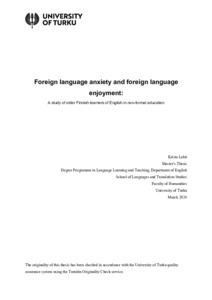Foreign language anxiety and foreign language enjoyment : A study of older Finnish learners of English in non-formal education
Lahti, Krista (2024-03-19)
Foreign language anxiety and foreign language enjoyment : A study of older Finnish learners of English in non-formal education
Lahti, Krista
(19.03.2024)
Julkaisu on tekijänoikeussäännösten alainen. Teosta voi lukea ja tulostaa henkilökohtaista käyttöä varten. Käyttö kaupallisiin tarkoituksiin on kielletty.
avoin
Julkaisun pysyvä osoite on:
https://urn.fi/URN:NBN:fi-fe2024042219946
https://urn.fi/URN:NBN:fi-fe2024042219946
Tiivistelmä
This thesis examined Foreign Language Anxiety (FLA) and Foreign Language Enjoyment (FLE) experienced by older Finnish learners of English in non-formal education. Specifically, the thesis aimed to find out how much FLA and FLE older learners experience, and what are the variables most associated with FLA and FLE. FLA is a well-studied concept in the field of Second Language Acquisition (SLA) and there has been an increasing interest in FLE recently. Previous studies have focused mainly on younger learners of Foreign Language (FL) while older learners have received notably less attention.
FLA is an emotion that causes negative physical and emotional arousal, having adverse effects to Foreign Language Learning (FLL) engagement and results. It can affect for example willingness to communicate and make learners avoidant. FLA is experienced by both beginners and advanced language learners, and it encompasses all areas of language learning, while being most prevalent in oral communication.
FLE has positive effects on language learning, increasing engagement and motivation, as well as having the potential to protect the learner from negative emotions. FLE includes not only a sense of accomplishment but is also characterized by, for example, optimal challenge. Both FLA and FLE can stem from the learner, but also from the learning environment, thus having personal and social causes.
This study had 112 participants who were over 50-year-olds learners of English coming from all over Finland. At the time of data collection, they partook in non-formal learning in their free time. The data was collected via an online survey consisting of background questions, Likert-scale questionnaires, and open-ended questions. This study used a mixed-method approach: the data was analysed both quantitatively and qualitatively.
The findings of the present study showed that older learners of English in non-formal education experienced both emotions, but significantly more FLE than FLA. The emotions were in a moderate negative correlation. Majority of the participants reported to not have experienced situations that especially evoked FLA, while almost everyone had experienced situations that especially evoked FLE. The qualitative data offered intriguing descriptions of experiences from the participants’ FL classes. Overall, the results of the present study indicated that FLL is fulfilling and important to this group of people. Limitations of the study included issues with collection of background information and the necessity to use translated versions of the questionnaires. In the future, more SLA studies could focus on older language learners.
FLA is an emotion that causes negative physical and emotional arousal, having adverse effects to Foreign Language Learning (FLL) engagement and results. It can affect for example willingness to communicate and make learners avoidant. FLA is experienced by both beginners and advanced language learners, and it encompasses all areas of language learning, while being most prevalent in oral communication.
FLE has positive effects on language learning, increasing engagement and motivation, as well as having the potential to protect the learner from negative emotions. FLE includes not only a sense of accomplishment but is also characterized by, for example, optimal challenge. Both FLA and FLE can stem from the learner, but also from the learning environment, thus having personal and social causes.
This study had 112 participants who were over 50-year-olds learners of English coming from all over Finland. At the time of data collection, they partook in non-formal learning in their free time. The data was collected via an online survey consisting of background questions, Likert-scale questionnaires, and open-ended questions. This study used a mixed-method approach: the data was analysed both quantitatively and qualitatively.
The findings of the present study showed that older learners of English in non-formal education experienced both emotions, but significantly more FLE than FLA. The emotions were in a moderate negative correlation. Majority of the participants reported to not have experienced situations that especially evoked FLA, while almost everyone had experienced situations that especially evoked FLE. The qualitative data offered intriguing descriptions of experiences from the participants’ FL classes. Overall, the results of the present study indicated that FLL is fulfilling and important to this group of people. Limitations of the study included issues with collection of background information and the necessity to use translated versions of the questionnaires. In the future, more SLA studies could focus on older language learners.
